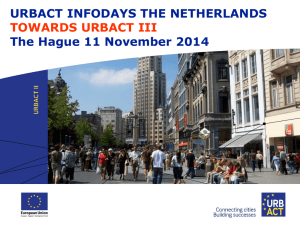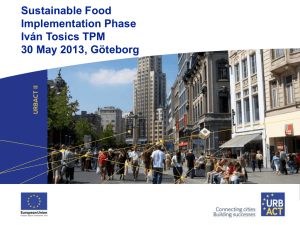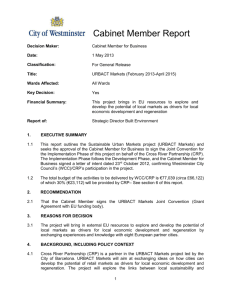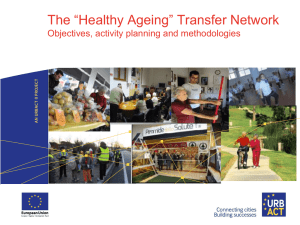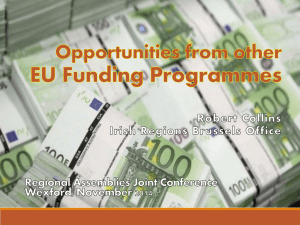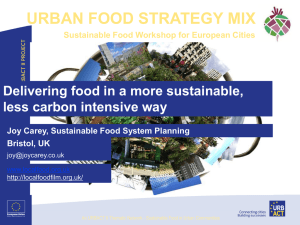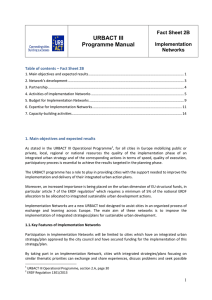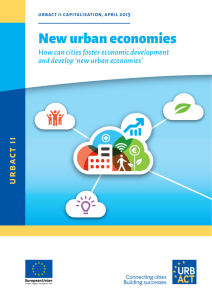Draft_Operational_Programme_of_URBACT_III_
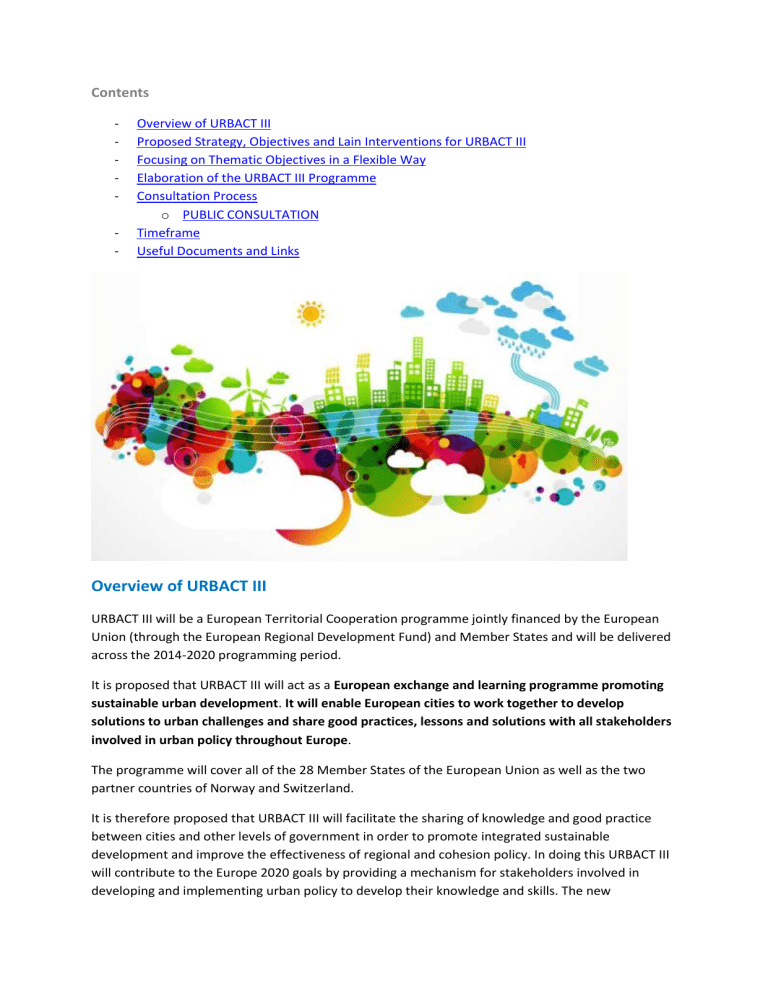
Contents
-
-
Proposed Strategy, Objectives and Lain Interventions for URBACT III
-
Focusing on Thematic Objectives in a Flexible Way
-
Elaboration of the URBACT III Programme
-
o
-
-
Overview of URBACT III
URBACT III will be a European Territorial Cooperation programme jointly financed by the European
Union (through the European Regional Development Fund) and Member States and will be delivered across the 2014-2020 programming period.
It is proposed that URBACT III will act as a European exchange and learning programme promoting
sustainable urban development. It will enable European cities to work together to develop solutions to urban challenges and share good practices, lessons and solutions with all stakeholders
involved in urban policy throughout Europe.
The programme will cover all of the 28 Member States of the European Union as well as the two partner countries of Norway and Switzerland.
It is therefore proposed that URBACT III will facilitate the sharing of knowledge and good practice between cities and other levels of government in order to promote integrated sustainable development and improve the effectiveness of regional and cohesion policy. In doing this URBACT III will contribute to the Europe 2020 goals by providing a mechanism for stakeholders involved in developing and implementing urban policy to develop their knowledge and skills. The new
knowledge and skills acquired from participation in the URBACT III programme will contribute to stronger and more vibrant European cities and help tackle a range of emerging urban issues linked to smart, sustainable and inclusive growth (the three Europe 2020 priorities).
Proposed Strategy, Objectives and Main Interventions for URBACT III
To respond to the numerous challenges facing urban areas, city administrations need to continually improve and build knowledge and skills to enable them to develop and implement sustainable integrated policy. This enhanced capacity will have positive impacts for the implementation of the
Operational Programmes in the 2014-2020 programming period when the urban dimension of the cohesion policy will be strengthened. Cities (especially small and medium sized ones) often lack the resources to identify and implement European good practice by themselves– and this problem is exacerbated in a period of austerity. URBACT III can be a relatively low cost route to accessing the latest thinking and practice for all cities across Europe. Critically, the programme combines this access to know-how with a focus on practical transfer of experience.
It is proposed that URBACT III will enable exchange and learning between elected officials, officers and other city stakeholders; contributing to the improved planning and implementation of integrated urban approaches in European cities.
We propose that the URBACT III programme is organised around four main objectives:
1.
Capacity for Policy Delivery: To improve the capacity of cities to manage sustainable urban policies and practices in an integrated and participative way.
2.
Policy Design: To improve the design of sustainable urban policies and practices in cities.
3.
Policy Implementation: To improve the implementation of integrated and sustainable urban strategies and actions in cities
4.
Building and Sharing Knowledge: To ensure that practitioners and decision makers at all levels have access to knowledge and share know how on all aspects of sustainable urban development in order to improve urban development policies.
To reach these objectives, URBACT III would develop three types of interventions: transnational
exchange, capacity-building and capitalisation & dissemination. Each of these interventions would build upon the strengths developed in URBACT II.
Focusing on Thematic Objectives in a Flexible Way
Although the type and nature of urban issues vary from city to city, URBACT III will particularly focus on a number of common ones which European cities face. In doing so, the need to address a wide range of urban themes must be balanced with that of concentrating programme resources on achieving the Europe 2020 goals. Therefore, we propose to concentrate the programme resources for exchange and learning on issues relating to the following five thematic objectives:
Thematic Objective 1: Strengthening research, technological development and innovation
Thematic Objective 4: Supporting the shift towards a low-carbon economy in all sectors
Thematic Objective 6: Protecting the environment and promoting resource efficiency
Thematic Objective 8: Promoting employment and supporting labour mobility
Thematic Objective 9: Promoting social inclusion and combating poverty
This concentration will be achieved through the targeting of the calls for proposals for URBACT III activities on these thematic objectives.
Elaboration of the URBACT III Programme
In 2012, the decision was made to create a Joint Programming Working Group (JPWG) with the following objectives:
To lay down the principles for the URBACT III Programme in terms of content and
organisation, and
To prepare a first draft of the future Operational Programme co-produced by all JPWG
members.
The JPWG is composed of representatives of interested Member States (MS) and Partner States (PS), representatives of the European Commission (EC), of the future Managing Authority (MA) and of the current URBACT II Secretariat.
Members of the JPWG participate in the regular meetings of the JPWG where range of the issues regarding the elaboration of the new programme is covered.
Consultation Process
Consultation process on the new Programme is organised in four levels:
Consultation with stakeholders of the Programme: URBACT Stakeholders are continuously consulted on their needs in respect of the new Programme via questionnaires and other communication means;
Consultation with EU-level institutional stakeholders: This consultation aims to gain the views of EU level stakeholders on the development of the URBACT III programme. The consultation will help ensure that the opinions and ideas of a range of EU stakeholders are fed into the emerging programme but also to identify possible ways of cooperation for the future with European level organisations concerned with sustainable urban development:
National consultations: Consultation with stakeholders will be carried out by each individual
Member state, once the final draft of the Operational Programme will be agreed;
Public consultation.
PUBLIC CONSULTATION
The following web form allows stakeholders to participate in the public consultation process and to provide their contributions on the future URBACT Programme by the end of April 2014.
URBACT Secretariat would be grateful to receive your contributions and feedback on these questions:
What are the most important urban challenges faced by cities like yours? How can transnational exchange networks support cities in addressing these challenges?
What kind of capacities and skills should be strengthened at local level to translate the lessons from URBACT networks into concrete action (e.g. in terms of city management, of policy instruments, policy areas related to urban issues, etc.)?
How could the programme cater to these needs in terms of capacity-building activities?
Which are the main obstacles for cities to participate in the URBACT programme?
Timeframe
First completed draft of the Operational Programme (OP) – February 2014
Public consultation via website – by the end of 2014
Submission of the OP to the European Commission – June 2014
Final approval of the OP by the European Commission – last quarter of 2014
URBACT III “Infodays” in the Members States – the end of 2014/ the beginning of 2015
The first call of the projects – February 2015
URBACT conference – June 2015
Useful Documents and Links
European Union’s ten-year growth strategy Europe 2020
Regulatory Framework for European Structural and Investment Funds 2014-2020
URBACT II – Future Orientations – EU-level consultation, Brussels - 19 february 2014
